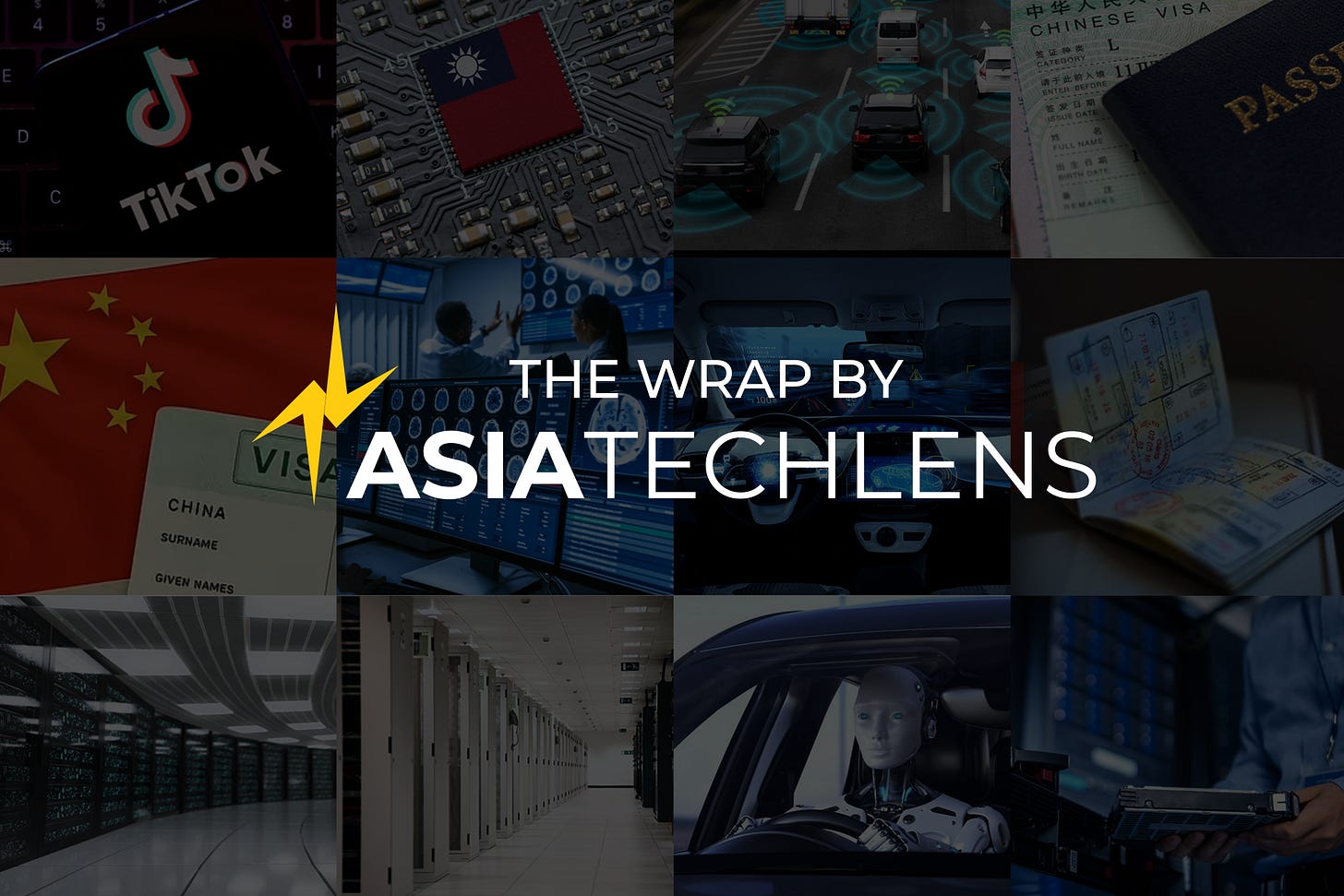The Wrap | 6 – 12 Sept 2025
The weekly digest from Asia Tech Lens: news, context, and signals shaping the future - tracking the innovations, policies, and market shifts across Asia

Robotics | China
Ant Group Enters the Humanoid Robots Race
Competition in China’s robotics industry is heating up and how! The latest entrant is Ant Group’s Shanghai Ant Lingbo Technology Co. (also known as Robbyant). At the 2025 Inclusion Conference in Shanghai, the company unveiled its R1 humanoid robot, capable of serving as a tour guide, sorting medicine at pharmacies, offering basic medical consultation, and even assisting in the kitchen.
Bottom Line: Ant’s humanoid push shows China’s fintech giants moving into the next frontier of intelligent machines.
AI | China
Baidu, Alibaba Raise the Stakes in AI Rivalry
China’s AI heavyweights unveiled fresh firepower this week. On Sept 9, Baidu released ERNIE X1.1, saying it improves factual accuracy by 34.8% and matches models like GPT-5 and Gemini 2.5 Pro, while outperforming DeepSeek R1-0528 on its benchmarks.
Three days later, Alibaba Cloud open-sourced Qwen3-Next, an 80-billion-parameter model it says is 10× faster and costs one-tenth as much to train as its April predecessor.
Bottom Line: Baidu bets on proprietary upgrades, Alibaba on open source - both raising the stakes in China’s AI race.
AI | China
Alibaba Backs AI Video Platform
PixVerse, an AI video creation platform developed by Beijing-based startup AIsphere, has raised $60 million in Series B funding led by Alibaba and participation from a new investor, Antler. The platform which boasts of more than 100 million users worldwide has gained traction for its ability to generate short-form and marketing videos using text and image prompts.
AI benchmark firm Artificial Analysis ranked PixVerse’s latest model V5 as the industry-leading model globally for image-to-video generation, beating Google’s Veo 3.
Bottom line: PixVerse is emerging as a benchmark-setter in AI video, with Alibaba’s backing fueling its global ambitions.
AI | Central Asia
Kazakhstan to Launch an AI and Digital Development Ministry
President Kassym-Jomart Tokayev this week announced the creation of a Ministry of Artificial Intelligence and Digital Development, a move designed to fast-track the country’s ambition of becoming a fully digitalized nation within three years. The ministry, to be helmed by a Deputy Prime Minister-level official, will oversee the building of a complete digital asset ecosystem.
Former Prime Minister of the Kyrgyz Republic, Djoomart Otorbaev told Asia Tech Lens in Singapore: “Only two events can be compared with artificial intelligence - electricity, & computers. We must match the capacity of our young talents, who are very thirsty to make breakthroughs. The fact that we are creating AI ministries, which will not only persuade startups to run interesting projects, but also to make regulatory environment - is very important.”
Bottom Line: Central Asia is making AI a state priority, determined not to be left behind in a world dominated by the US-China tech rivalry.
AI | Singapore
Singapore Launches AI Search Engine for Lawyers
Singapore unveiled new AI tools this week aimed at transforming legal and corporate work. The Infocomm Media Development Authority and the Singapore Academy of Law launched GPT-Legal Q&A, an AI-powered search engine which is designed to cut contract-law research time for more than 75% of Singapore’s lawyers. Trained on judgments, statutes, and legal texts, the tool lets users ask questions in plain language and get contextual, referenced answers.
Bottom Line: New legal AI tools show Singapore embedding generative AI into professional services.
AI Safety | Australia
Australia to Regulate AI Chatbots Over Child Safety
Australia has become the first country to move against AI chatbots over child safety concerns. eSafety Commissioner Julie Inman Grant this week registered six new codes under the Online Safety Act, requiring tech companies to build in safeguards and age checks before deploying chatbots.
The decision follows reports of children as young as 10 spending up to six hours a day on AI companions, many of them sexualized. The codes apply to chatbot apps, social media platforms, app stores, and device makers.
Bottom Line: Australia’s chatbot rules set an early global precedent for child-safety regulation in AI.
Data Security | China
China Penalizes Dior for Illegal Cross-Border Data Transfer
China’s public security authority has penalized Dior’s Shanghai subsidiary after finding it sent customers’ personal information to France without the required safeguards. Investigators said the company transferred information without a security assessment or contract, failed to obtain separate user consent, and neglected basic protections. The case followed reports of a data leak in May that led to official warning texts sent to Dior customers in mainland China.
Bottom line: Dior’s penalty highlights Beijing’s hard line on data sovereignty and the risks of cross-border transfers.
EV | Singapore
Singapore Extends EV Rebates; Hybrids No Longer Eligible
Singapore, aiming to phase out fossil fuel vehicles by 2040, has extended its EV incentive schemes beyond 2025 with some modifications: scrapping rebates for hybrids and raising surcharges on high-emission cars. The shift coincides with record Chinese EV sales: 7,796 units registered in the first seven months of 2025, already surpassing 2024’s total.
While BYD still leads the pack, its dominance has eased. 15 other Chinese brands, including Chery, Geely, Xpeng, and Zeekr, together sold 2,264 EVs in the first seven months of 2025, up from 1,581 from 11 such brands across all of last year.
Bottom Line: Data shows that Singapore’s EV transition is gathering pace, even as subsidies taper, the policy direction is clear.
Signals to Watch
Will Baidu’s ERNIE X1.1 claims stand up in independent benchmarks?
How will rivals respond to Ant’s humanoid push?
Can Kazakhstan’s AI ministry translate ambition into execution?
Will Australia’s chatbot rules spark global copycats?


